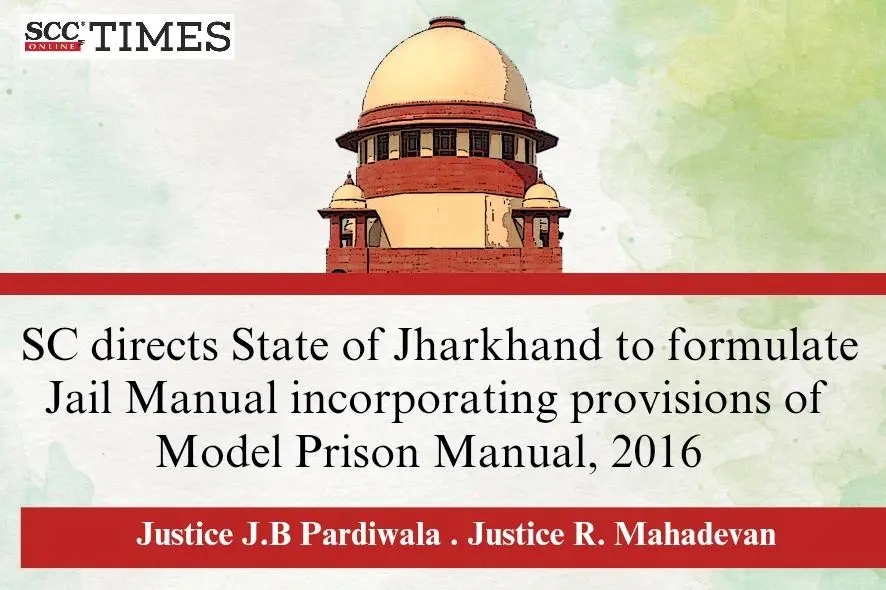Supreme Court: While considering the instant appeal by the State against final order of the High Court quashing the memo issued by Inspector General of Prisons, Ranchi, making intra-State transfer of the respondent from Lok Nayak Jai Prakash Narayan Central Jail, Hazaribagh, to Central Jail, Dumka, within Jharkhand; the Division Bench of J.B. Pardiwala and R. Mahadevan*, JJ., reiterated the call for prison reforms for creating a better environment and prison culture to ensure the prisoners enjoy their right to dignified life under Article 21 of the Constitution. The Court pointed out that there is no clear-cut picture regarding prison administration and the facilities available to the prisoners in the prisons in the State of Jharkhand.
Therefore, the Court directed State of Jharkhand to formulate or expedite the formulation of a Jail Manual incorporating the applicable provisions of the 2016 Model Prison Manual, for effective prison administration and ensure its strict compliance by the prison authorities.
Background and Contentions:
The respondent was convicted in connection with a case arising out of Hazaribagh Sadar P.S. for the alleged offences under sections 302/120-B/34, 353/34, 341/34 of the Penal Code, 1860, Sections 25(1-A), 26/35, 27(2) of the Arms Act, 1959, r/w Sections 3/4/5 of the Explosive Substances Act, 1908, and was sentenced to undergo life imprisonment. He was also implicated as accused in other cases in the Districts of Hazaribagh, Chatra, Ramgarh and Ranchi.
The respondent alleged that without affording any opportunity and in violation of the principles the respondent was transferred from Lok Nayak Jai Prakash Narayan Central Jail, Hazaribagh, to the Central Jail, Dumka, by memo dated 17-05-2023 of the Inspector General of Prisons.
Counsel for the appellant contended that respondent is a gangster and is known across the State of Jharkhand for his notoriety, having stronghold in four Districts namely, Ranchi, Hazaribagh, Ramgarh and Chatra of the State of Jharkhand. It was submitted that the respondent did not disclose his entire criminal antecedents and made a false statement to this effect in the writ petition that ‘no new case has been instituted against him’. Jharkhand High Court, without appreciating this fact, set aside the order transferring the respondent to some other jail. It was further submitted that the respondent’s transfer order was issued due to apprehension of gang war/ untoward incident inside the jail, and insufficient Kachpals in keeping strict vigilance over such criminals.
Per contra, counsel for the respondent submitted that there was no material on record to demonstrate that the respondent was involved in any untoward incident inside the prison, nor the appellants produced any substantive evidence to fortify their claim for transfer. As such, the apprehension of gang war expressed by the appellants is unfounded. Counsel for the respondent further submitted that the character certificate of an inmate is routinely sought for before arriving at any administrative or judicial decision. However, in the present case, without inquiring into the character of the respondent, the Inspector General of Prisons, Jharkhand, passed the transfer order on 17-05-2023, which only creates suspicion that the same was passed without application of mind, in a pre-determined manner and with mala fide intention.
Court’s Assessment:
Perusing the matter, the Court examined the impugned memo issued by the Inspector General of Prisons and observed that transfer was made entirely on the recommendation of the District Commissioner and the Superintendent of Police, Hazaribagh, based on the letter dated 16-05-2023 addressed by the Superintendent, Lok Nayak Jaiprakash Narayan Central Jail, Hazaribagh. The Court further noted that the communication dated 16-5-2023 mentioned the threat of gang war / untoward incident in the prison. Thus, the reason for such transfer was that the confinement of two notorious criminals in the same prison raised a gang war threat, and the shortage of kachpals would hinder control over the criminals and pose a challenge for the jail administration and hence, transfer was sought for effective maintenance of the prison.
The Court pointed out that State of Jharkhand was brought into existence in 2000 by carving out certain southern districts of Bihar. The State of Jharkhand has adopted many Acts and Rules applicable to the State of Bihar. The Jail Manual, 1925 as applicable to the State of Bihar has been adopted by the State of Jharkhand.
Taking note of Section 29 of Prisoner’s Act, 1900 r/w Rule 770(B) of the Jail Manual, 1925, the Court pointed out that Section 29 makes it clear that removal of any prisoner in a prison to any other prison within the State is at the instance of the State Government, in cases where the prisoner is confined in circumstances mentioned by clauses (a) to (d) of Section 29 (1); and subject to the order and under the control of the State Government, the Inspector General of Prisons is empowered to remove any prisoner confined as aforesaid in a prison to any other prison in the State. The said provision does not speak about an undertrial prisoner. That apart, Rule 770(B) empowers the Inspector General to shift/transfer a prisoner from one jail to another jail on sufficient grounds.
The first limb of Section 29 empowers the State government to issue general or specific order to remove the prisoner under any of the circumstances in Section 29(1). Section 29(2) of confers similar powers to the Inspector General of Prisons to order for such transfer, however subject to orders and under the control of the State Government.
The Court pointed out that in the instant case, no adverse order or proceeding of the State government was brought to the Court’s knowledge. The substantive right flows from the Section and Rules as applicable, enables the Inspector General of Prisons, on discretion to transfer a prisoner from one prison to another or from one class to another. The Court however cautioned that such discretion cannot be exercised arbitrarily. Admittedly, the respondent herein is a life convict and undergoing sentence in the Central Jail, Hazaribagh. In view of the said provisions of law, the order of transfer passed by the Inspector General of Prisons citing administrative grounds, was in accordance with law.
The Court further pointed out that there is a duty on the Inspector General of Prisons to ensure the safety of all the inmates in the prison. The measure to transfer the respondent was essential to ensure not only the safety of the prisoner but also to disrupt and neutralize the potential for gang-related violence within the prison. Such decision of shifting the respondent was only in the larger interest of maintaining security of the prison. There is a profound rational behind the decision and therefore, such decision does not suffer from the vice of arbitrariness. Thus, the Court opined that transfer of the respondent to some other jail is not only lawful, but also necessary for his safety and security. However, the High Court erred in setting aside the same, by the order impugned herein, which is liable to be set aside.
In its concluding remarks, the Court reiterated the necessity of prison reforms and stated that it is essential to continuously monitor the physical conditions prevailing in the prison, compliance with basic and fundamental rights of the prisoners, etc. The State recognizes that a prisoner loses his right to liberty but still maintains his right to be treated as a human being and as person; his human dignity shall be maintained, and all basic amenities should be made available to him. “Discipline and order shall be maintained with firmness, but with no more restriction than is necessary for safe custody and well-ordered community life, with due regard to the maintenance of the rights of prisoners”.
Therefore, allowing the instant appeal, the Court directed the State of Jharkhand to formulate a Jail Manual in accordance with Model Prison Manual 2016.
CASE DETAILS
|
Citation: Appellants : Respondents : |
Advocates who appeared in this case For Petitioner(s): For Respondent(s): |
CORAM :







